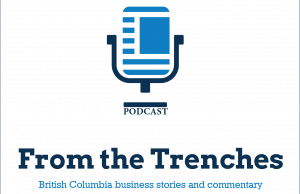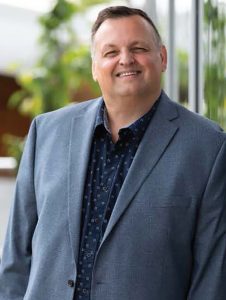
Lee Rowley is the Managing Principal of Herold Engineering Ltd., a leading Vancouver Island-based consulting engineering firm. Business Examiner Publisher John MacDonald interviewed Rowley on his “From The Trenches” podcast recently, discussing advances in technology impacting the construction and development sector, management strategies, and how they grew their business in the COVID pandemic. Herold was started in 1994 by Mike Herold, and the team includes 80 full and part-time staff in Nanaimo, Victoria and Ucluelet.
MacDonald: How did your business adapt initially to COVID and then how have you approached growth in this new reality.

Lee Rowley, Managing Principal of Herold Engineering Ltd
Lee Rowley: I think we’ve always been flexible with our staff in terms of hours and trying to accommodate work-life balance on Vancouver Island. It’s a big part of what makes Herold Engineering a good place to work, so when we initially had to pivot to remote working, we had some of the systems in place. Certainly our I. T. Manager did a sterling job pivoting us quickly to working from home. There was a period where most people were away from the office but after a few months people started to migrate back. We didn’t really mandate it, but people generally just wanted to return to work. Zoom and Teams are here to stay, but Zoom isn’t a great vehicle for creativity, as team synergy and energy really doesn’t translate that well over Zoom. But for meetings which are more administratively focused and structured, Zoom is really a good vehicle to save time and money.
MacDonald: How has Herold separated itself from other engineering firms on the Island?
Rowley: It’s more of the client-agent type role where we coordinate the various professionals and designers in the group on behalf of clients. We’re not competing with contractors, for example, as we are mainly there to act as client agents and support the client in the delivery of the project. It’s rewarding work and it’s a performance-based role where you need to actually deliver to get repeat work. In terms of growth, that has been partly due to our relationship-based approach, providing a wide range of services which makes us a little bit unique. We’re a smallish firm so it gives us a bit of a diversity for resisting certain market changes. The best business development you can have is the project that you were on last, so we certainly want to leave our projects with a positive attitude. We also really try to engage our staff and management in the community so we support and do a lot of activities and sponsor a lot of sports teams and local charities.
MacDonald: What do you have going on in the next several months?
Lee Rowley: We continue to be busy and we’ve been wrestling with hiring. We’ve actually had to look at recruitment agents to find staff. We’ve just had a big move in Victoria so there’s lots of positive changes that have been occurring. In the next 3 to 6 months, we will focus on stability and consolidation, and our principal group will be planning for the future, looking at our succession plan.
MacDonald: Is there a recent project you’re particularly proud of?
Rowley: The Lake Trail school edition in Courtenay. It’s quite an innovative project that is a partial upgrade to the school, and we’re using mass timber as a floor and roof system.
MacDonald: Tell me about your background and how you got involved with Herold.
Rowley: I am from the United Kingdom, so while I was there I transitioned from a consultant to a contractor. Then I moved to Calgary and worked for a consultancy again, and then went into project management. I moved over to Alberta Infrastructure, working for government in their project management group. Then this opportunity came up out of the blue. It was a big change because Herold Engineering is the smallest organization I’ve actually worked in. But for me it was a natural progression.
MacDonald: Have you seen an evolution in yourself as a leader?
Rowley: My changes over time have been to focus on communication and coordination and as we grow bigger. The challenge is to keep the corporate culture fun and creative whilst having a framework in place to ensure the work is being done right and our service levels are still high. It’s a delicate balance because you want stuff to be engaged in and enjoy things, but you don’t want chaos. My changes now are in scalability, making sure that I look at the whole company rather than just the buildings group.
MacDonald: Can you speak to the involvement of machine learning and artificial intelligence in the construction industry?
Lee Rowley: Software has gotten better and faster, but the functions are still much the same. They are definitely easier to use now.
On the design side, it’s a little early to say we’re going to push a button and somebody’s house design will be done, but it’s getting there. Software that was used in larger companies is now being used in smaller companies. . .project management software, data handling software, etc. But you still need a person to flick through the drawings and you’re still going to need people to build stuff on the design side. I think there’s going to be more powerful tools. The only downside is that technology gets you further away from the reality of design and construction. We have to be careful that we’re not under or over designing things.
MacDonald: Is there anything else that particularly excites you?
Rowley: We’re looking at quantity measurements. It’s all to do with whether it’s feasible or not, and whether the processing power is there, but eventually it will be the use of drones in field review work. It’s really handy, especially if with tall structures. 3D printing of buildings is kind of cool as well. You can 3D print with one material at the moment, so it will be interesting to see how sophisticated they get and what materials they use, and how affordable and sustainable it is. Energy modelling is another exciting software that building codes are driving and there are new challenges in terms of energy efficiency.
MacDonald: What is some of the best personal advice you’ve received?
Rowley: Brian Clancy was the president of the first consultancy firm I work for. He asked me “Why didn’t you put your project up for a prize?”, because he was going to nominate me for the prize. He said “if you don’t tell anybody when you do something, nobody else is going to advocate for you. So make sure you let people know if you do a good job. Tell people – don’t expect others to advocate on your behalf. He wasn’t doing that to show off. He was just saying that engineers can be too modest. So now if there’s something I feel that we have done well, I’ll let people know.

